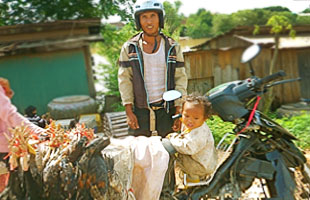Joint news release between the Ministry of Health of the Kingdom of Cambodia and the World Health Organization

The Ministry of Health (MoH) of the Kingdom of Cambodia wishes to advise members of the public that one (1) new human case of avian influenza has been confirmed for the H5N1 virus. This is the 6th such case this year and the 53rd person reported to be infected with the H5N1 virus in Cambodia. The case is from Phnom Penh City. Of these 53 confirmed cases, 41 have been children under 14, and 29 of the 53 have been female. In addition, since the first case was confirmed in Cambodia in 2005, only 18 of the 53 cases have survived.
A 3-year-old boy from Prey Lyea village, Sangkat Chom-Chao commune, Khan Por-SenChey district, Phnom Penh province, was detected by the National Institute of Public Health (NIPH) on 3rd March and confirmed H5N1 positive by Institut Pasteur du Cambodge (IPC), on 3rd March. The boy had onset symptoms of fever, cough, running nose and vomiting on 22nd February 2014. His parents sought treatment for him at a private clinic on the same day. His condition worsened and the boy was admitted to National Paediatric Hospital (NPH) on 28th February. On 2nd March, the boy had symptoms of fever, cough, running nose, vomiting, dyspnea, and cyanoses and was transferred to Calmette Hospital on the same day. The boy died about one hour after his admission on 2nd March.
Around mid-February, over 90% of the chickens and a small number of ducks suddenly died in the village. The boy often visited a neighbour’s house where the poultry had died. Relatives reported that the boy had no direct contact with poultry, but the chickens died in close proximity to the boy’s house.
The national and local Rapid Response Teams (RRTs) are conducting outbreak investigation and responses following the national protocol.
"Avian influenza H5N1 remains a serious threat to the health of all Cambodians and more so for children, who seem to be most vulnerable and are at high risk. There have been 53 cases of H5N1 infection in humans since 2005 and here is the sixth case of this year. Children often care for domestic poultry by feeding them, cleaning pens and gathering eggs. Children may also have closer contact with poultry as they often treat them as pets and also seem to be most vulnerable and are at high risk because they like to play where poultry are found. I urge parents and guardians to keep children away from sick or dead poultry and prevent them from playing with chickens and ducks. Parents and guardians must also make sure children thoroughly wash their hands with soap and water before eating and after any contact with poultry. Hands may carry the virus that cannot be seen by the naked eye. Soap washes away the virus on hands. If children have fast or difficult breathing, their parents should seek medical attention at the nearest health facility and attending physicians must be made aware of any exposure to sick or dead poultry,” said H.E. Dr. Mam Bunheng, Minister of Health.
A nationwide public health education campaign using radio was launched at the end of January, with prevention messages. Also, a public health education campaign is being conducted in Prey Lyea village, Phnom Penh City using information, education and communications materials to inform families on how to protect themselves from contracting avian influenza. The government's message is - Wash hands often with soap and water, before eating and after coming into contact with poultry; keep children away from poultry; keep poultry away from living areas; do not eat dead or sick poultry; and all poultry eaten should be well cooked.
H5N1 influenza is a flu that normally spreads between sick poultry, but it can sometimes spread from poultry to humans. Human H5N1 avian influenza is a very serious disease that requires hospitalization. Although the H5N1 virus currently does not easily spread among humans, if the virus changes it could easily be spread like seasonal influenza. Hence, early recognition of cases is important.
The Ministry of Health will continue to keep the public informed of developments via the MoH website www.cdcmoh.gov.kh where relevant health education materials can also be downloaded.
For more information on human influenza please call the MoH Influenza Hotline numbers: 115 (free call); 012 488 981 or 089 669 567




